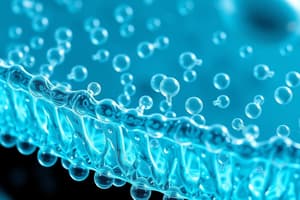Podcast
Questions and Answers
Which of the following is a common phosphoglyceride?
Which of the following is a common phosphoglyceride?
- Unsaturated fat
- Cholesterol
- Triglyceride
- Phosphatidylserine (PS) (correct)
Name two notable specialized phospholipids.
Name two notable specialized phospholipids.
Cardiolipin and Plasmalogen
Sphingomyelin is created from sphingosine and glycerol.
Sphingomyelin is created from sphingosine and glycerol.
False (B)
Why is choline considered an essential dietary nutrient?
Why is choline considered an essential dietary nutrient?
What is unique about Phosphatidylinositol?
What is unique about Phosphatidylinositol?
What role does Phosphatidylinositol (PI) play in signal transduction?
What role does Phosphatidylinositol (PI) play in signal transduction?
Which enzyme removes fatty acid at position 2 of glycerol?
Which enzyme removes fatty acid at position 2 of glycerol?
What are cerebrosides?
What are cerebrosides?
Sphingolipidoses result from a deficiency in enzyme required for degradation of glycosphingolipids.
Sphingolipidoses result from a deficiency in enzyme required for degradation of glycosphingolipids.
What organ systems are affected in Niemann-Pick disease?
What organ systems are affected in Niemann-Pick disease?
What condition is characterized by neurological impairment and is usually fatal in early life?
What condition is characterized by neurological impairment and is usually fatal in early life?
What is Fabry disease associated with?
What is Fabry disease associated with?
Flashcards are hidden until you start studying
Study Notes
Common Phosphoglycerides
- Phosphatidylserine (PS) forms from phosphatidic acid (PA) and serine.
- Phosphatidylethanolamine (PE, cephalin) results from PA and ethanolamine.
- Phosphatidylcholine (PC, lecithin) is created by combining PA with choline.
- Phosphatidylglycerol (PG) derives from PA and glycerol.
- Phosphatidylinositol (PI) is formed from PA and inositol.
Specialized Phospholipids
- Cardiolipin is found exclusively in the inner mitochondrial membrane, crucial for respiratory complexes.
- Plasmalogen functions as an antioxidant, protecting membrane phospholipids and includes platelet-activating factor (PAF).
Sphingomyelins
- Sphingomyelins have a sphingosine backbone instead of glycerol.
- They form through the amide linkage of sphingosine and fatty acids to create ceramide.
- Phosphorylcholine esterifies carbon 1 of ceramide to produce sphingomyelin, essential for myelin in nerves.
Choline as an Essential Nutrient
- Dipalmitoylphosphatidylcholine (DPPC) is vital for lung surfactant.
- Synthetic surfactants are used to treat respiratory distress syndrome (RDS), also known as hyaline membrane disease.
Unique Aspects of Phosphatidylinositol
- PI typically contains stearic acid on carbon 1 and arachidonic acid on carbon 2 of glycerol.
- Serves as a reservoir of arachidonic acid, providing substrates for prostaglandin synthesis.
Role of PI in Signal Transduction
- In signal transduction, GDP is exchanged for GTP.
- Cell stimulation by hormones and neurotransmitters activates phospholipase C to cleave PIP2.
- Produces inositol 1,4,5-trisphosphate (IP3) which mobilizes intracellular calcium, as well as diacylglycerol for protein kinase C activation.
Phospholipid Degradation
- Various phospholipases target glycerophospholipid phosphodiester bonds.
- Phospholipase A1 removes fatty acid from position 1.
- Phospholipase A2 removes fatty acid from position 2, liberating arachidonic acid for signaling pathways.
- Phospholipase C acts in liver lysosomes, producing second messengers from PIP2.
- Phospholipase D cleaves alcohol from phosphoglycerides, yielding phosphatidic acid.
Neutral Glycosphingolipids
- Cerebrosides represent the simplest form, consisting of ceramide and a monosaccharide (galactose or glucose).
Sphingolipidoses
- Defective enzymes in glycosphingolipid degradation lead to substrate lipid accumulation, harming cells.
- Degradation occurs in lysosomes, with hydrolase deficiencies causing lipid build-up.
- Most sphingolipidoses result in neurological impairment and are typically fatal early in life; except Fabry Disease, an X-linked condition.
Niemann-Pick Disease
- Characterized by accumulation in brain, liver, and spleen, leading to various health issues.
Tay-Sachs Disease
- Involves the accumulation of GM2 gangliosides due to hexosaminidase A deficiency, leading to severe neurological impairment.
Fabry Disease
- An X-linked disorder caused by deficiency of alpha-galactosidase A, resulting in cardiovascular, renal, and cutaneous complications.
Studying That Suits You
Use AI to generate personalized quizzes and flashcards to suit your learning preferences.




